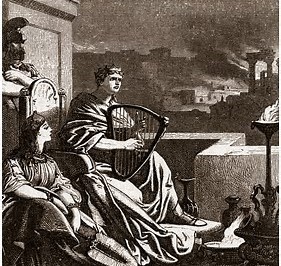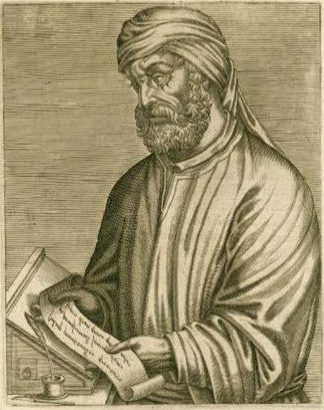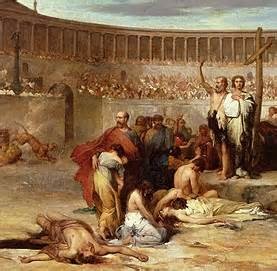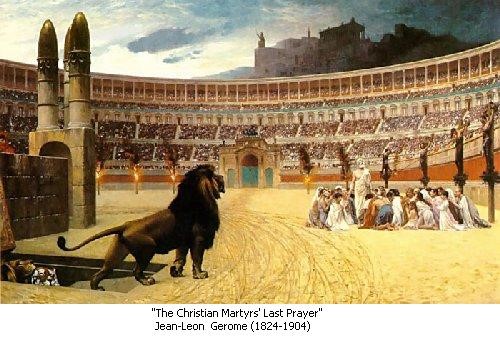ISIS, throughout their so-called caliphate, is crucifying, butchering, and setting fire to Christians. While we are abhorred by this barbaric evil, this is nothing new for Christians. 2000 years ago Christ’s followers were experiencing the same evil that ISIS does to Christians today. Within a generation of Christ’s crucifixion, first-century Christians suffered similar fates under the precursor of ISIS behavior, the barbaric Roman emperor, Nero. During Nero’s reign, Christians followed their Savior to their deaths, some nailed to cruel crosses, some fed to lions or wild dogs. Others were tied to stakes, tarred and set on fire to light the coliseum and the streets of Rome. (The description evokes what the writer of Hebrews said about saints persecuted in Old Testament times: They were stoned, they were sawn in two, they were killed with the sword. They went about in skins of sheep and goats, destitute, afflicted, mistreated–of whom the world was not worthy, Heb 11:37-38 ESV).
ISIS could be considered the new Nero.
In the previous post in this series, we noted that as ISIS is creating refugees among Christ’s followers, so did Herod to Christ himself. The latter drove the child Jesus into exile in Egypt. During Christ’s life, the seeds of rebellion grew in Israel under the increasingly heavy hand of the Roman occupation. Eventually a Roman cross was used to crucify Jesus, the savior.
Within a generation of Christ’s resurrection, Christianity began its spread across North Africa and southern Europe. It reached the heart of the empire – Rome. An offshoot of Judaism, this company of Christians spoke of Jesus as the long-awaited Jewish King and founder of a kingdom, birthed in heaven and now extended to earth.
Just as the life and teachings of Jesus were rejected by Jewish authorities and feared by the Romans, so too the lives and message of Christ’s followers provoked a similar reaction from both Jewish and Roman authorities. Christ’s followers proclaimed Jesus as King. They served His kingdom. They promoted a movement of love, compassion, justice and freedom that was countercultural to both the paganism of Rome and the legalism of many Jews.
In December of AD 37 a child was born who would become the sixth emperor of the Roman Republic. In 54 he ascended the throne. His name was Nero.
Just four years later, in the tradition of Herod the Great, Nero turned murderous to quell a perceived palace revolt. He ordered his own mother’s execution. In AD 62 Nero’s friend Tigellinus became prefecture of Nero’s praetorian guards. Tigellinus quickly restored the treason laws and began to arrest the Roman nobility for sedition. Many were executed. Following on this “purifying” movement, Nero suspected his young wife Octavia. He divorced and then murdered her. This power-loving, immoral tyrant quickly spiraled out of control, leading to a catastrophe of much wider scope.
I n the summer of 64, a conflagration broke out in Rome. It burned for six days and seven nights, destroying three-quarters of the city, leaving thousands dead and more than 200,000 homeless and without food. The city’s economy was devastated. What was Nero’s action in this frightful calamity? It is said that the emperor fiddled while the city burned. He literally sat in the tower of Macaenas, played on his harp, and sang about the legendary burning of Troy a thousand years earlier.
n the summer of 64, a conflagration broke out in Rome. It burned for six days and seven nights, destroying three-quarters of the city, leaving thousands dead and more than 200,000 homeless and without food. The city’s economy was devastated. What was Nero’s action in this frightful calamity? It is said that the emperor fiddled while the city burned. He literally sat in the tower of Macaenas, played on his harp, and sang about the legendary burning of Troy a thousand years earlier.
Nero was reported to have started the fire. To defuse the rumors, he created a scapegoat: the Christian church. He ordered some of the Christian leaders to be arrested and tortured, and finally laid the responsibility at the feet of all Christ followers.
 Tertullian, a church father and early Christian author from Carthage in North Africa, writes in his “Apology to the Nations” that the persecution of the Christians was institutum Neronianum — an institution of Nero. Scholars do not agree if the document Tertullian saw was a set of laws and decrees justifying the targeting of Christians for persecution or merely a description of the persecution of the Christians. In any case, it is likely that this is what Peter was referring to in 1 Peter 4:16, “However, if you suffer as a Christian, do not be ashamed, but praise God that you bear that name.” The epistle was likely written in the midst of the persecution and suffering of these early Christians in Rome.
Tertullian, a church father and early Christian author from Carthage in North Africa, writes in his “Apology to the Nations” that the persecution of the Christians was institutum Neronianum — an institution of Nero. Scholars do not agree if the document Tertullian saw was a set of laws and decrees justifying the targeting of Christians for persecution or merely a description of the persecution of the Christians. In any case, it is likely that this is what Peter was referring to in 1 Peter 4:16, “However, if you suffer as a Christian, do not be ashamed, but praise God that you bear that name.” The epistle was likely written in the midst of the persecution and suffering of these early Christians in Rome.
The Roman historian Tacitus witnessed the great fire of Rome as an 8-year-old. He saw the subsequent persecution of Christians. In his book Annals, he writes:
Therefore, to stop the rumor [that he had set Rome on fire], [Emperor Nero] falsely charged with guilt, and punished with the most fearful tortures, the persons commonly called Christians, who were [generally] hated for their enormities. Christus, the founder of that name, was put to death as a criminal by Pontius Pilate, procurator of Judea, in the reign of Tiberius, but the pernicious superstition – repressed for a time, broke out yet again, not only through Judea – where the mischief originated, but through the city of Rome also, whither all things horrible and disgraceful flow from all quarters, as to a common receptacle, and where they are encouraged. Accordingly first those were arrested who confessed they were Christians; next on their information, a vast multitude were convicted, not so much on the charge of burning the city, as of “hating the human race.”
 Nero’s appetite for blood and grisly entertainment seems to have had no bounds. Tacitus listed some of the forms of terror and torture he unleashed.
Nero’s appetite for blood and grisly entertainment seems to have had no bounds. Tacitus listed some of the forms of terror and torture he unleashed.
In their very deaths they were made the subjects of sport: for they were covered with the hides of wild beasts, and worried to death by dogs, or nailed to crosses, or set fire to, and when the day waned, burned to serve for the evening lights. Nero offered his own garden players for the spectacle, and exhibited a Circensian game, indiscriminately mingling with the common people in the dress of a charioteer, or else standing in his chariot. For this cause a feeling of compassion arose towards the sufferers, though guilty and deserving of exemplary capital punishment, because they seemed not to be cut off for the public good, but were victims of the ferocity of one man.
In this context the Apostle Peter wrote his first letter to the suffering church. Before we unpack the letter, we will look at the author, who himself became one of those first-century martyrs.
- Darrow Miller






